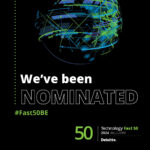Looking at historical data
Historical data plays a vital role in predicting whether a guest will contribute to your targets. When we talk about historical data, there are three types to keep in mind.
1. Behavioural data during events
The first type of data looks at a guest’s behaviour in relation to your previous events. Some examples are:
- What events did this guest attend before?
- For how many different events did this person already get invited to?
- How often was this person a no-show?
- …
Does your data show that your guest always registers but never shows up? Then don’t invite him again in the future.
2. Business-related data
The second type of data gives an insight into the professional side of guests. Here we’ll talk about data that relates to someone’s professional information. Some examples of questions are:
- In which industry is this person active?
- What products does this guest buy from our organisation?
- Is this person’s turnover increasing or decreasing?
- …
With this information, sales could invite leads that just had the first contact to a casual event, like a dinner in the business seats of a football game. There you’ll have a more relaxed atmosphere; the perfect scenario to learn a bit more about each other.
3. Personal data
The last type of data is more practical. Here you’ll find who the guest is as a person. But be aware: there’s a lot of data you’re not allowed to store due to GDPR (like religion, sexual preference, etc.) Some examples of data you can store:
- What function does this person have?
- What language does he or she speak?
- What is this person interested in? For example football, opera, marketing, …
Don’t invite someone to your next cycling VIP event when you know someone is not interested in cycling.
With these three types of data, you can form an event profile for every possible guest. Use that info to build your guest list. You’ll be able to identify qualitative guests. When you succeed to do so, you’ll enjoy a whole lot of advantages…
Historical data creates bottomline impact
You’ll create a better match between event and guest if you look at historical data when creating your guestlist. At the end of the ride you’ll notice a bunch of advantages. We’ll go through the five biggest:
A better registration rate
The event and the invitees match. Therefore, more invitees will register for your event. Your event room will be sold out sooner than you’re used to. On top of that you’re saving yourself a bunch of time and effort to follow up on the whole invitation process.
Better targeting means a higher ROI
Because you know your audience, you’ll be able to attract more qualitative guests to your event. You realise that filled seats don’t necessarily mean you’ll achieve your goals; it’s who’s sitting in that seat that counts. The right, qualitative guest, will assure you of reaching your goals.
Higher satisfaction with guests
With a clear target audience, the event room will be filled with like-minded guests. Therefore, the event will offer some exciting network opportunities. Next, their interests will come close to the content of your event. The right people and the right content: the recipe to a successful event.
Happier senior management
It goes without saying that management is happy when you reach predetermined goals. As a result, you’ll have to put in less effort to justify an extra financial injection towards your event strategy. They believe in the approach: now it’s time to upscale.
Fewer no-shows
Historical data lets you predict your guests’ behaviour. Someone who has often registered but doesn’t show up during the event; will you invite him/her to the next event? If you don’t, you’ll have less waste, and fewer missed opportunities.
It all comes down to the wrong guests creating a negative spiral to your event. So it’s best to think twice about who you’ll invite. You see, the quality of your guests is of life importance to the success of your event.
An overview of your historical data
Looking at historical data sounds easier said than done. A lot of companies have the correct data; it’s just that it’s scattered around. They have to look through emails, excel spreadsheets, CRM systems, and so on. And on top of that, they’re not always sure what data to collect during events.
Many companies are asking for a centralised system to store historical event data. InviteDesk is a tool that fully automates this process. On top of that, you can organise the entire invitation process with InviteDesk.



